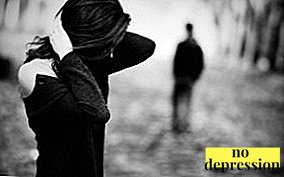The phrase "I hate my child" causes condemnation in society. How can you hate children, especially relatives, blood? Unfortunately you can. Under certain circumstances, maternal instinct does not wake up from a woman. Such mothers often morally destroy and even maim their own children. Next, we will try to understand why this is happening and what needs to be done in such a situation.
Hate and Postpartum Depression
You will be surprised, but such a diagnosis can be made by 13% of women, but in practice, only 3% of them go to a specialist. Postpartum depression, the household and the patient herself are often mistaken for personal negative traits. However, it is a disease that can progress without treatment. According to ICD-10, postnatal (postpartum) depression develops within 6 weeks after delivery and manifests itself with the following symptoms:
-
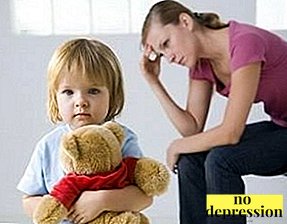 increased fatigue;
increased fatigue; - bad mood most of the day;
- loss of interest;
- lack of pleasure from communicating with the child;
- unwillingness to perform usual duties;
- sleep disturbance and appetite;
- decrease in concentration, memory;
- indecision;
- self-flagellation;
- pessimistic vision of the future;
- sapovrazhdure;
- sexual problems;
- thoughts of suicide;
- detachment from the child.
A depressed woman may not perceive the child at all, if he is quiet and calm, does not approach him, refuses to breastfeed. Another manifestation of the disease - irritability and outbreaks of aggression towards the baby. Most often, hatred appears to children who are restless, cry a lot and scream.
Women with an unstable psyche who have a history of mental illness living or living in a family where violence is acceptable are more prone to postpartum depression. Other significant factors are: intolerable living conditions, lack of support and assistance, a sharp decrease in sex hormones, dissatisfaction with their own appearance.
Childfree
Literally, childfree translates as "freedom from children." This is an ideology characterized by a conscious reluctance to have children, which is in no way connected with infertility. People referring themselves to childfree, explain their attitude as follows:
-
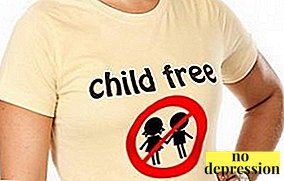 "I hate children, they hold in a vice and deprive of normal life"
"I hate children, they hold in a vice and deprive of normal life" - "Pregnant such klushi, look just sucks"
- "Doubtful happiness to stay with a mutilated body and three screaming larvae"
- "Children - a hindrance to a full and colorful life"
- "Life is given for pleasure. What a crime to spend it on children"
- "I hate babies, they only do what they shit and scream."
Childfrey phenomenon is explained by the depression of sexual and reproductive behavior. These people are alien to the instinct of reproduction, motherhood. Mentally childfree are quite healthy, often reach heights in their careers, are distinguished by erudition, self-sufficiency, balance. They do not resort to physical violence, do not rape and do not kill children, on the contrary, in every possible way avoid contact with them. In general, all that childfree can be blamed for is the blasphemous phrase "I hate pregnant women and children."
Hatred of grown children
It happens that parents begin to hate their child when they become adults. Most often this contributes to the bad deeds of the child, more rarely - unfulfilled hopes. For example, a woman can say “I hate my daughter,” if she instead of using her talent as an opera singer filed for elite prostitutes or did not take place as a mother, abandoned her children. The most common causes of hatred for adult children and teenage children:
- change of orientation, gender;
- drug addiction, alcoholism;
- disrespect for parents, lies, use of force, theft;
- committing a serious crime (pedophilia, murder, etc.).
In these cases, hatred of the child does not appear spontaneously, it matures for a long time. Despite blood ties, not all parents are endowed with angelic patience and can experience all-forgiving love. Such people usually have conservative views. Hatred reaches its climax with other unfavorable factors: illness, loneliness, difficult material situation, climax in women.
Hate to foster children
Admit to the family of a non-native child, especially with a disability, few can. And even with everything that seemed to be ready, there is a risk one day to come to the idea of "I hate my adopted child." Blood children are always easier to raise, if only because heredity is not burdensome.
Most adoptive parents in a difficult situation are thinking, and not whether to give the baby back to the shelter. First of all, I would like to advise you not to hurry. It is necessary to do everything possible and impossible to establish warm relations, otherwise the remorse of conscience will torment until the end of days. What can be done:
-
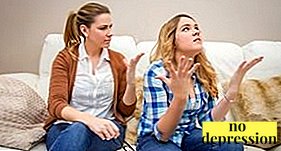 Reduce the list of requirements for yourself and your child. Less expectations - less negative. Allow yourself to be imperfect parents (within the limits of the permissible). Take the foster child as he is. You do not have to love him as your own. Enough good education and warm attitude. To be less annoyed, the solution of particularly acute problems for you can be entrusted to your spouse.
Reduce the list of requirements for yourself and your child. Less expectations - less negative. Allow yourself to be imperfect parents (within the limits of the permissible). Take the foster child as he is. You do not have to love him as your own. Enough good education and warm attitude. To be less annoyed, the solution of particularly acute problems for you can be entrusted to your spouse. - Start attending remedial developmental activities. There you can not only learn how to cope with the child’s behavior, understand him and cope with your emotions, but also get to know the same parents as you. The exchange of experience is invaluable, especially in such difficult situations as raising foster "heavy" children.
And, of course, foster parents need to be less engaged in self-digging. They must remember that they have done a good deed. At the same time, he loves children as their relatives or not, it’s a second matter. The main thing is for the child to see a good example, to be brought up in a friendly atmosphere, not to have a need and not to be bullied.
Hate children spouse
Many women are not ready to accept the past life of her husband, they hate their former spouse and children. Especially often this happens if a man regularly participates in their lives. Then the lawful spouse thinks: "How is it, he devotes so much time to the old family, and me? I'm better? Maybe he is trying to sit on two chairs or wants to return to them altogether."
It also happens that the former actively builds machinations, sets up her child against the new father's family. But it is fair to note that even without prompting from the mother's side, children often harm the stepmother or stepfather in the hope of reuniting their beloved parents.
What to do? Before shouting "I hate the husband's child from the first marriage," a woman needs to remember that she herself chose a man with a "trailer". Hence all the resulting problems. In order to somehow smooth the situation, you should:
- not to prohibit a man to communicate with his children;
- never talk bad about them, and especially “I hate your children”;
- explain to children that you are not claiming the role of a mother, but only of a friend;
- give his children time;
- the rebellious child should be treated condescendingly, but not allowed to violate the framework of decency.
In extreme cases, you can completely limit contact with his children. He can spend time with them, chat, walk, but without your participation. Over time, the situation may change.
Hate in hard life circumstances
A woman who is unhappy, it is hard to experience positive emotions and to show warm feelings to anyone. Rather, the internal negative, dissatisfaction, irritation from their own powerlessness can result in hatred for their child. What circumstances may be:
-
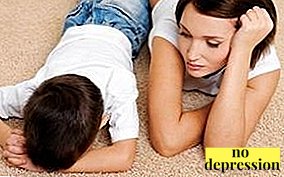 loss of permanent residence;
loss of permanent residence; - lack of livelihood;
- death of a loved one;
- disability incident;
- serious illness.
Coupled with personal characteristics such problems can lead to the oppression of their own children. To a greater extent, women tend to such behavior, dry emotionally, for whom love manifests itself in material things. For lack of opportunities to its manifestation, they begin to hate themselves, and then their child.
What to do?
First of all, a woman needs to ask the question: "Why do I hate children?". This is very important, because hate is always only a consequence. To get rid of this painful feeling, it is necessary to eliminate its cause. For example, to cure depression or improve material well-being, work through personal problems, learn how to interact and accept children, overcome fear and guilt.
You need to be prepared for the fact that the problem is not solved in three accounts. You have a long and hard work. But only hard at first. As you get rid of hate, the pleasure of contact with the child will increase, there will be warm feelings and pride in yourself. Of course, it is better to carry out such work with a family psychologist. But something can be done independently, for example, to read books on child psychology, to start taking sedatives.
If you hate a child and cannot cope with aggression, are violent, and do not want to work on yourself, then you should choose the lesser of two evils. In some cases it is advisable to give the baby to raise her husband from his first marriage, grandmother or foster family.
Advice of the author. A woman who has recently given birth may have frightening thoughts “I hate my own child”. What to do in this situation? If along with anger for the baby there are tender feelings, you should not despair. Love for children grows stronger as they grow, learn, educate, enjoyable contact. You can not concentrate on negative emotions. If you are tired, you should “tuck it up” a little and just spend time with the kid - lie in bed all day, play interesting children's games by age. It is especially good to make friendships with an experienced mom, to walk together, to visit each other for tea. In this way, you can learn from other people’s experience, relax over a conversation, share “children's problems”, and even a child will benefit from contact with the same baby.
They say that from love to hate is one step, as well as vice versa. Does this apply to children? And what is love in general? Love is when you look at your child with aspiration and "float"? Or when you embrace him in the midst of everyday adversity and understand that you cannot live without it? Or when you restrain an attack of vomiting and for the hundredth time patiently wipe your poo smeared on the walls? Or maybe love is to reprimand a child for misconduct, wanting to raise a worthy person? Apparently, it is impossible to verify love precisely. One thing is clear, if the child is not indifferent, it means that in his own way he is important and dear. Further depends on adults. Will they be able to make a step towards the child or will they take the easy way?

 increased fatigue;
increased fatigue; "I hate children, they hold in a vice and deprive of normal life"
"I hate children, they hold in a vice and deprive of normal life" Reduce the list of requirements for yourself and your child. Less expectations - less negative. Allow yourself to be imperfect parents (within the limits of the permissible). Take the foster child as he is. You do not have to love him as your own. Enough good education and warm attitude. To be less annoyed, the solution of particularly acute problems for you can be entrusted to your spouse.
Reduce the list of requirements for yourself and your child. Less expectations - less negative. Allow yourself to be imperfect parents (within the limits of the permissible). Take the foster child as he is. You do not have to love him as your own. Enough good education and warm attitude. To be less annoyed, the solution of particularly acute problems for you can be entrusted to your spouse. loss of permanent residence;
loss of permanent residence;

